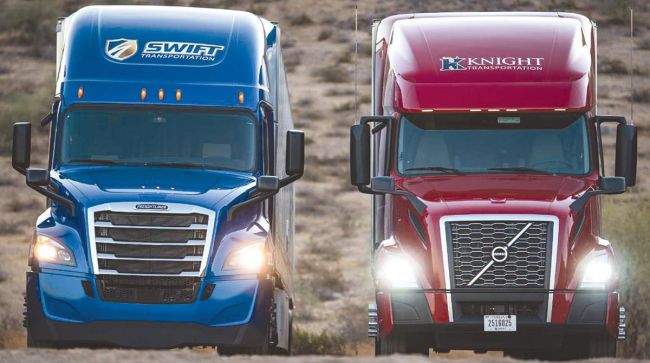(Knight-Swift Transportation Holdings Inc. via PowerPoint)
Knight-Swift Transportation Holdings Inc. on July 20 reported that earnings dropped 71% year-over-year in the second quarter.
The Phoenix-based truckload motor carrier posted net income attributable to the company of $63.3 million, or 39 cents a diluted share, for the three months ending June 30. That compared with $219.5 million, or $1.35 a share, during the same time the previous year. Total revenue decreased 20.8% to $1.55 billion from $1.96 billion.
The results fell below expectations on Wall Street; analysts had been looking for 55 cents per share and quarterly revenue of $1.59 billion, according to Zacks Consensus Estimate.
“We’re now over a year into a freight down cycle with an unusual combination of dynamics at work to create a particularly difficult operating environment,” CEO David Jackson said during a call with investors. “I don’t know that we’ve ever seen freight demand fall this far so fast and for so long without an accompanying economic recession.”
Jackson added that he is not suggesting that truckload demand softness is an automatic read-through or predictive indicator of broader economic weakness. He is even encouraged with how consumers and the economy have digested interest rate increases and their positive impact on inflation.
“But the truckload market was severely impacted by the reduction from the unusual and enormous growth in inventories that built in the latter part of 2021 and into 2022,” Jackson said. “The worst of those adjustments appear to be behind us, and we expect further normalization in the flow of goods and supply chains. This normalization is now being met with less truckload capacity as carriers have not survived the harsh truckload freight environment.”

How effective have third-party services proved to be for fleets? Let’s find out with Michael Precia of Fleetworthy Solutions and Dan Rutherford with Summit Virtual CFO by Anders. Tune in above or by going to RoadSigns.ttnews.com.
Jackson added that one of the reasons carriers have exited the market is a lack of cost reprieve that a decline in truckload freight demand would normally bring. He pointed to inventory destocking efforts as preventing that. He added a broader economic recession would have matched those soft freight volumes with significantly lower fuel prices, very low equipment costs and a loose labor market.
“None of those cost concessions have been present this time, leading to margin pressure [and] business failures for others,” Jackson said. “These prolonged challenges are setting up for an eventual strong recovery. Such recoveries often come from an unlikely catalyst, and can be difficult to predict with precision.”
Knight-Swift announced less than a week after the quarter ended that it closed on a previously announced acquisition of U.S. Xpress Enterprises. Jackson acknowledged the difficult business environment at the time but argued the transaction was a chance to improve earnings, gain customers and reach more professional drivers.
“We are positioned to grind in the current environment and thrive as conditions improve,” Jackson said. “This includes our newly acquired U.S. Xpress. Additionally, we have significant opportunities, unique to Knight-Swift, such as the build-out of our LTL network.”
- Truckload revenue for Q2 decreased 15.5% to $829.4 million from $981.5 million during the same time last year. Operating income fell 67.1% to $67.9 million from $206.3 million last year. The report noted soft demand and an uptick in driver turnover became headwinds for volumes and utilization. Revenue per loaded mile declined 11% year-over-year ,while miles per tractor decreased 3.3%. The segment consists of irregular route truckload, dedicated truckload, refrigerated, expedited, flatbed and cross-border operations.
- Less-than-truckload revenue increased 2% to $228.6 million from $224.2 million. Operating income declined 30.9% to $30.2 million from $43.8 million. The segment experienced degradation in its adjusted operating ratio year-over-year amid softer volumes, higher wages and a decline in fuel surcharges. The softer demand led shipments per day to decrease 3.9% year-over-year. Revenue per hundredweight increased 7%, while revenue per shipment increased 5.9%.
- Logistics revenue decreased 52.4% to $117.8 million from $247.3 million. Operating income decreased 78.1% to $9.57 million from $43.7 million. The reported noted that pressure on top-line pricing is no longer being offset by corresponding reductions in purchased transportation costs. The brokerage space continues to endure soft demand, which has resulted in revenue per load decreasing by 26.8% year-over-year.
- Intermodal revenue decreased 21.5% to $104.3 million from $132.9 million. Operating income fell 146.8% to a loss of $6.63 million from a gain of $14.2 million. The report noted that while load count increased 4% year-over-year, revenue per load declined 24.5% as a result of soft demand, competitive truck capacity and the winding down of a container leasing project.
Knight-Swift ranks No. 7 on the Transport Topics Top 100 list of the largest for-hire carriers in North America.






